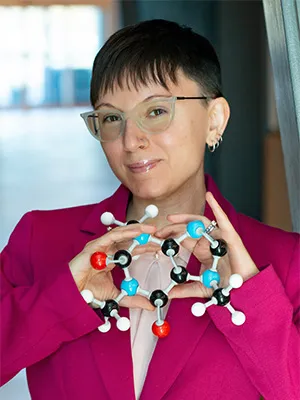
Dr. Keri A. Flanagan
Academic Rank:
Associate Professor, Chemistry
Department:
Biology & Chemistry
School:
Health Professions & Natural Sciences
Office: SH 250
Phone: 973-328-5732
Email: kflanagan@ccm.edu
Education: D.M.H., Drew University M.S., University of North Carolina B.S., Montclair State University
As a young girl, Assistant Professor of Chemistry Keri A. Flanagan loved reading about astronomy, dinosaurs and anatomy.
“I grew up in the woods of rural Pennsylvania. I spent most of my time outdoors and always enjoyed observing animals and plants,” she recalls.
She credits her continuing love for science, chemistry in particular, to her high school teacher Mrs. Giblin. With the encouragement of her teacher, Flanagan took AP chemistry in high school and also did an independent study in organic chemistry.
“Science really was just an initial interest as a child that continued to grow and solidify as I aged,” she says.
She started her higher education at Montclair State University graduating with her Bachelor of Science in chemistry. She continued her education at the University of North Carolina where she earned a Master of Science in pharmaceutical sciences with a concentration in medicinal chemistry.
As a graduate student, Flanagan worked in a lab focused on finding compounds that inhibited the RecA (Recombinase A) protein. That protein aids DNA repair in bacteria and by inhibiting it bacteria are prevented from becoming resistant to currently used antibiotics.
Along with her lab work, Flanagan also was a teaching assistant while in graduate school.
“Unlike most of my classmates who observed this as a hindrance to their research, I rather enjoyed my teaching assistant assignments,” she says. “I was saddened when I completed my teaching requirements and was expected to be in lab 100 percent of the time. This is what solidified, for me, that I wanted to teach at the college level.”
Flanagan began teaching at County College of Morris in 2011. At CCM, she teaches Organic Chemistry I and II Lecture and Laboratory, Introduction to Chemistry Lecture and Laboratory and Instrumental Methods of Analysis. She loves seeing the dedication that her students have and how hard they work to achieve an A or B.
“About two hours before class, I have many students stop by to ask questions. They are always questions that show me how focused they are on doing the homework problems and how they need clarification on details and difficult concepts, not just explanations of basic concepts,” she says. “They truly put in the time and effort needed to learn organic chemistry and it is so gratifying to see.”
She has also has teamed up with three other female faculty members in science and math at CCM to encourage more young women to pursue careers in science, technology, engineering and mathematics, or STEM fields as they collectively are known.
“STEM careers are extremely rewarding and also offer strong earning potential,” notes Flanagan. “Just like I was encouraged by a teacher to learn more about science, I’d like to be able to do that for other students.”